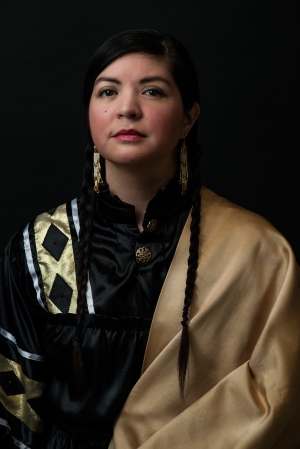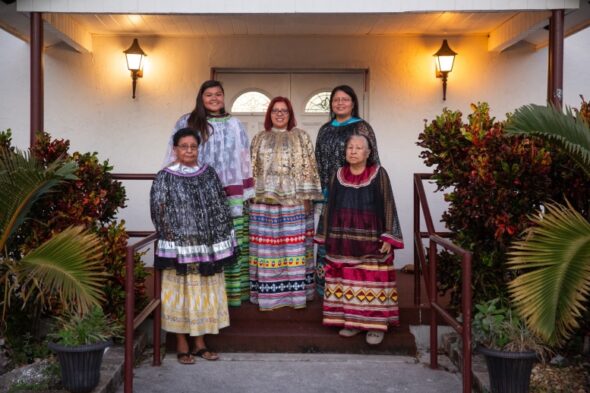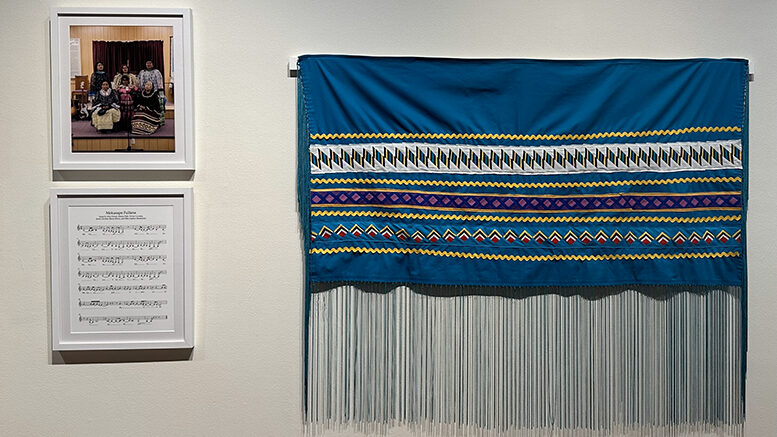By Sara Orr
Elisa Harkins has always been struck by the misrepresentation of Indigenous voices in artistic spaces and beyond.
“Museums paint natives in a way that makes them seem like things of the past, when that is not close to the truth. We are still here and creating,” she said. “I’m featuring them, not studying them.”
Harkins is a Cherokee/Muscogee Native American woman based in Tulsa, Oklahoma. She is a student of the College of Muscogee Nation, studying the language since 2021, and as an artist, her work focuses on language preservation and Indigenous musicology.
She has been working on her project “Teach Me a Song,” now on exhibit at Flagler College’s Crisp Ellert Art Museum, since 2019. The installation includes a video with songs sung by different artists, shawls representing each of the songs, a photo of the artist, and sheet music. The songs spread over a wide variety of genres, and were performed in different languages by people diverse in age, area, gender, and experience.
This project began when she came across sheet music that someone had transcribed from native artifacts incorrectly. The sheet music did not recognize who wrote the music or what it meant.

“I realized that there are so many times that non-native people go into native communities and try to record things, but it feels like it was more like they are collecting things,” she said. “I felt like I was in an area in Oklahoma with so many indigenous tribes that I could find a community to right the wrongs.”
The songs are in a variety of styles, one minute reflecting the airy folk sound of Joni Mitchell, and the next sounding like the country and blues of Johnny Cash. However, the indigenous culture and language is shown through the entire piece through language, clothing, and more.
The piece “Grandmother’s Song,” performed by an all-female hand drum group from Alberta, Canada. Harkins describes her experience in Alberta recording this for the project as a shocking one. Alberta is filled with homelessness and drug addiction in native communities. According to the Calgary Homeless Foundation (a foundation in Alberta), “on any given night, 41% of people experiencing homelessness in Calgary are of indigenous ancestry.”
Harkins said that not only was homelessness present, but drug addiction as well. “I saw native homeless person overdosing on the street directly outside of the museum where I was conducting research.” She also said that when going into restaurants, the staff reacted in a panicked way, knowing that she was indigenous and assuming that she would cause issues.

The Calgary Homeless Foundation says “Canada’s colonial policies and practices, including residential schools and the mass removal of thousands of Indigenous children from their families (…) have contributed to intergenerational trauma and a loss of connection to community and culture—all of which place Indigenous people at increased risk of experiencing homelessness.” Harkins describes the reservation that she visited in Alberta was at least 30 minutes away from any sort of grocery store, meaning that by design, without a car, one would be unable to live on the reservation. “The system is built against us,” Harkins said.
In fall of 2020, Harkins was the artist in residence at the Crisp Ellert Art Museum on campus, however, due to COVID, her experience back on campus has been quite different and more immersive. After returning to campus, Harkins said it brings her joy to see the college in a more vibrant state, with more people out and about. Julie Dickover, the director of the Crisp Ellert Art Museum, says she is grateful for Harkins’ return. She views the project as a “translation of indigenous language as a way to reclaim it,” as well as a “contact with other indigenous people around US as a sort of culture exchange.”
Cherokee/Muscogee musician Elisa Harkins’ exhibit “Teach Me A Song” serves to showcase vibrant Indigenous culture, which is often overlooked in the artistic realm and beyond. It opened in the Crisp Ellert Art Museum Sept. 7, and will remain open until October 18.



Be the first to comment on "‘Teach Me a Song:’ Indigenous music and art installation at Crisp Ellert"